
In a dramatic intervention that could reshape transatlantic relations, former US President Donald Trump has issued a stern warning to Sir Keir Starmer regarding Labour's stance on the Gaza conflict, threatening to withhold crucial intelligence sharing if the Labour leader becomes Prime Minister.
The Diplomatic Ultimatum
According to sources close to Trump's inner circle, the Republican frontrunner has made it clear through backchannel communications that a Starmer-led government would face immediate consequences if it fails to align with US policy in the Middle East. "There will be no special relationship," Trump reportedly stated, emphasising that intelligence cooperation would be "severely limited" under a Labour administration.
Labour's Internal Divisions Exposed
The revelation comes as senior Labour figures, including shadow home secretary Yvette Cooper, express deepening concerns about the party's position on Gaza. Multiple shadow ministers have privately warned that the current approach is creating significant vulnerabilities that opponents could exploit.
One shadow minister revealed: "We're walking into a trap. The Tories will use this to question our commitment to national security and our reliability as an international partner."
Intelligence Sharing at Stake
The potential breakdown in intelligence cooperation represents a grave threat to UK security. The "Five Eyes" alliance, which includes the US, UK, Canada, Australia and New Zealand, has been fundamental to British counter-terrorism operations and national security strategy for decades.
Security experts warn that any degradation of this relationship could:
- Compromise counter-terrorism operations
- Limit access to vital threat intelligence
- Undermine joint security initiatives
- Weaken the UK's global standing
Political Fallout and Strategic Implications
The timing of Trump's warning couldn't be more sensitive, with the Labour leadership attempting to balance internal party pressure over Gaza with maintaining credibility on the international stage. The situation exposes the delicate tightrope Starmer must walk between progressive elements within his party and the realities of global diplomacy.
As one senior Labour source acknowledged: "This isn't just about foreign policy - it's about whether Britain remains America's closest ally or becomes just another European voice."
The developing situation suggests that the first major test of a potential Starmer government might come not from domestic politics, but from the unpredictable nature of US-UK relations in a potential second Trump administration.






